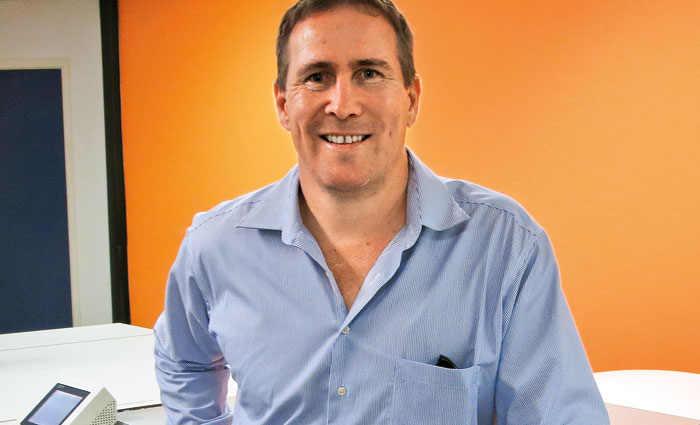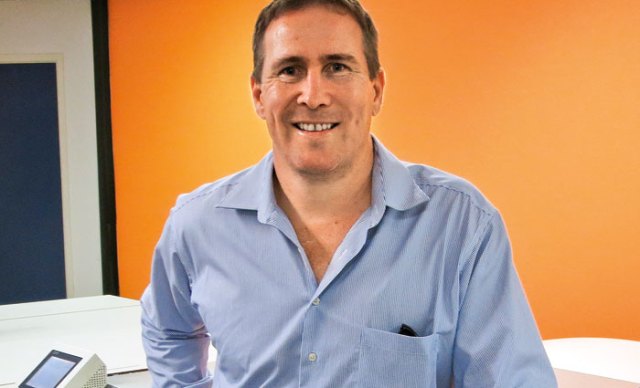
Gavin Allen doesn’t think of himself as a footballer. He considers himself a printer. He may have won two premierships with the Brisbane Broncos, represented Queensland in the State of Origin, spent six years as team manager for the national rugby league side and recently taken a role as the Maroons’ media manager, but his focus is on his business, Crystal Media Group.
This softly spoken giant is reluctant to hark back to past glories. Ask the 46-year-old to pose for a photo with a football in his hand and he’ll tell you it’s not going to happen. Rugby league was just something he did in the past. Printing represents his present and future.
But the two are inextricably linked; Allen founded Crystal Media during his first season with the Broncos.
Growing up in Cairns, Allen had done a printing apprenticeship then worked in the industry at the start of his football career with St George in 1987 and 1988. But league commitments and injuries made it difficult for him to hold down a job. He moved from one employer to the next.
Self-made man
One day in 1989, he was scanning the classifieds in Brisbane when he noticed an ad for a secondhand one-colour Ryobi Itek perfector. Allen decided to buy the machine and become his own boss. He could choose his own hours and tailor his work to his sport.
Allen set up office at home and initially printed letterheads, business cards and business forms for shops, small businesses and government agencies. He held high hopes of being an instant success – but they were soon dashed. “Business was terrible,” he says.
Allen’s first job was a disaster. He had to borrow money for the paper, because no one would give him an account. When he went to drop off the job late on a Friday, everybody had gone home, so he left it outside. He returned on Tuesday for payment… to find the premises locked and the company liquidated.
Football, though, had taught him a valuable lesson, one he still draws on today. The way to get out of a form slump is to work hard. Allen refused to give up and, slowly, through a combination of perseverance and word of mouth, business grew.
“Once you do that and put that work in, you will get results. You will always get results through hard work,” he says.
Being part of a football club offered access to a large network through all the players, officials, staff and sponsors. Being a Bronco opened doors. “I never seemed to struggle too much getting work. I could be competitive because it was just myself and I didn’t need a lot of money to live.”
Allen was the sole employee for the first two years. It took four years to secure a reliable revenue stream. The business moved out of home in year six, but it wasn’t until 15 years had passed before he felt it was properly established.
“The problem I had was that the money we would make, we rolled back into the place with equipment and staff,” he says.
Crystal Media almost ceased to exist in 1992. It was around this time that Allen’s football career was taking off. He had made his State of Origin debut a year earlier. He was to be part of the Broncos side that would win back-to-back titles in 1992-93. Rugby league was now providing a sustainable income and also giving him the cash needed to grow the business.
However, the old problem had returned: he was struggling to balance sporting and work commitments. The business was taking up more and more time and started to seem like a burden. “At stages there, I gave it less attention than it deserved.”
He was seriously considering shutting down Crystal Media when a contact offered to take over the day-to-day running of the business. He would do the printing and Allen would do the sales. It was the right offer at the right time. Sport and business could now both receive the attention they deserved.
Allen finished with Brisbane in 1995, then played a final season with the London Broncos in 1996. Unlike some footballers, he had no problems giving the game away, describing retirement as “the happiest day of my life”. He returned to Brisbane eager to move on.
“When I retired from football, I couldn’t wait to return to the printing business and not have to worry about serving two masters,” he says.
The company then had six employees who had to be paid out of a turnover that was less than $100,000. Yet it wasn’t the challenge it seemed, according to Allen, because “margins were a lot better then. Now the margins are very low.”
Crystal Media was originally known as Crystal Print, named after a beautiful waterhole in Cairns called Crystal Cascades. The name change in 2000 came about because Allen wanted to make it clear to potential clients that his business also did design. It also reflected a desire to be innovative and on the lookout for new opportunities, he says.
“If you think you’re just going to be putting ink on paper, you’re limiting yourself. We’re very open to anything that comes along and we think there’s opportunity there to expand our business.”
Crystal Media is 70% offset printing and 30% large-format and short-run digital. Coming years are expected to see a decline in offset but a rise in digital, artwork and design. Regardless of what the future holds, Allen is determined not to get pigeonholed as a printer.
Times have changed
Allen says life has become tougher for printers in the years since he gave rugby league away. Overcapacity has left them with a smaller slice of the pie. Advertisers are also more cautious about spending money and less wedded to traditional models. He believes more consolidation is needed. In the meantime, the search for new revenue streams continues.
Allen learned early on that whatever you want to sell, good customer service is essential. If anything, his Broncos connections opened too many doors. He had access to corporate clients that at the time he couldn’t properly service due to a lack of experience and equipment. Many of those doors weren’t opened a second time.
Conversely, Allen noticed the positive results as his one-man business developed a reputation for quality. “Once you can do that, it gives you the confidence to knock on anyone’s doors.”
Crystal Media continues to pride itself on customer service. The 15-staff outfit doesn’t need to do much selling these days as 95% of its new clients are referrals, according to Allen. The key is to build trust by following through on promises, he says. Listening also helps.
“We try to be different. We try to engage the customer in the process of printing and design. We give them what they require not what we want them to require. The end result is that the customer comes back and places another order.”
The company’s turnover is “well into seven figures”, says Allen. He doesn’t have a growth target for Crystal Media; he says he prefers to focus on meeting clients’ needs and ensuring he and his staff have a healthy work-life balance. He is also more focused on getting more out of existing clients than winning new ones.
“We don’t particularly care about growth. I don’t have a goal to grow my business by any certain percentage. We want to build in a way where we can do more work for our customers,” he says.
But while Allen thinks of himself as a printer rather than a footballer, rugby league has a place in his heart. He never gets sick of talking about those two premierships and he still enjoys spending time with former star teammates Allan Langer, Trevor Gillmeister and Andrew Gee. His client list even includes the Brisbane Broncos and Suncorp Stadium (which will always be Lang Park to him).
But when Allen is with his regular friends, regular matters are discussed. When he’s with his former teammates, the talk is about the future not the past. He doesn’t even watch much rugby league, although he’s developed renewed enthusiasm for the game since he started coaching his son’s under-13 team and even acted as Queensland’s media manager in the recent State of Origin series.
That’s another thing about Allen; he’s a family man. His wife and four children mean infinitely more to him than anything he may have done on the football field.
He also feels a deep affection for printing and is excited about what the future holds – whatever it may be. “We’ll be printing in 10 years, but I can’t tell you want we’ll be printing. The whole landscape of printing might have changed. We could be printing circuit boards. We’re predominantly an offset printer now, but in 10 years’ time we could be sign printers or label printers or any type of printer, because we’re always changing and growing.”
Twenty-three years on, he’s still passionate about a business he began all those years ago when he was a youngster making a name for himself in the rugby league world.
RESUMÉ
Born: Cairns, 1965
Career history: 1989-present: owner, Crystal Media Group; 1987-88: printer, various Sydney printers; 1986-87: printer, Webb and Sons, Brisbane; 1981-85: apprentice, GK Bolton Printers, Cairns
Education: Trinity Bay High, Cairns
Family: Wife and four children, aged seven, nine, 11 and 13
GAVIN ALLEN ON…
His State of Origin role
I couldn’t think of anything easier in life than taking trophies off NSW people. It was enjoyable being media manager. I’d been Australian team manager for the past six years but hadn’t done the Queensland job before. It was very much a reunion, because you had Mal Meninga, Trevor Gillmeister, Allan Langer and Mark Coyne – all those guys I’ve played with.
Being hired and fired in his early days
The jobs were short and they weren’t sweet either. They got rid of me pretty quick. They do that when you’re injured and have to go to the physio and can’t turn up for work. It wasn’t easy, but I was getting paid reasonable money to play football, so it wasn’t like I was struggling.
His first press
The Ryobi Itek perfector was a little cracker of a machine. I bought it for $9,000, had it for three years, ran the absolute guts out of it and traded it for $11,000. I don’t know how I pulled that off. I’m still trying to work it out. That was back in the days when you could still make money out of printing.
Advances in technology
It’s important to keep abreast of technology, as opposed to keep up with it. I don’t want to be at the cutting edge, because you can be a guinea pig and your mistakes become very expensive. I’ve seen stuff that wasn’t quite ready and the price point wasn’t there and you wait and it gets to where it needs to be.
Leadership
I think it’s up to you as a leader to set the culture in your business. The right culture means getting the right people, so they all come together and work together. You learn to choose people who are going to fit into the culture you’ve built. I prefer to have people who are going to get on with the others and enjoy their time at work. We like a happy workplace.
Comment below to have your say on this story.
If you have a news story or tip-off, get in touch at editorial@sprinter.com.au.
Sign up to the Sprinter newsletter


